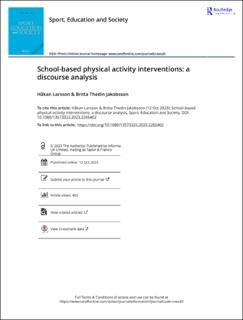| dc.contributor.author | Larsson, Nils Håkan Olof | |
| dc.contributor.author | Jakobsson, Britta Thedin | |
| dc.date.accessioned | 2024-03-18T07:39:17Z | |
| dc.date.available | 2024-03-18T07:39:17Z | |
| dc.date.created | 2023-11-01T11:07:22Z | |
| dc.date.issued | 2023 | |
| dc.identifier.citation | Sport, Education and Society. 2023, Artikkel 2265402. | en_US |
| dc.identifier.issn | 1357-3322 | |
| dc.identifier.uri | https://hdl.handle.net/11250/3122768 | |
| dc.description | This is an Open Access article distributed under the terms of the Creative Commons Attribution-NonCommercial-NoDerivatives License (http://creativecommons.org/licenses/by-nc-nd/4.0/), which permits non-commercial re-use, distribution, and reproduction in any medium, provided the original work is properly cited, and is not altered, transformed, or built upon in any way. The terms on which this article has been published allow the posting of the Accepted Manuscript in a repository by the author(s) or with their consent. | en_US |
| dc.description.abstract | School-based physical activity (PA) interventions stand out as a highly valued knowledge technology in relation to attempts to promote daily physical activity (DPA) among school youth. The purpose of the paper is to explore technologies of knowledge that guide school-based PA interventions in lower secondary schools and discuss their power-related implications. Foucault’s notion of discourse as the ensemble of regulated, deliberate, and finalised ways of doing things underpins the analysis of six school-based PA intervention studies that were identified in the literature between the years 2003 and 2021. The analysis concerned the scientific domain of the studies, their justification of school-based PA interventions, the purpose and results of the interventions, and problems with implementing the interventions. The analysis indicated a distinct narrative where researchers within medical science and psychology proposed that (a) young people's level of PA is too low and therefore they are increasingly exposed to the risk of lifestyle diseases; (b) schools appear as the obvious context for attempts to increase the PA of young people, for example through interventions; (c) contextual factors are often pointed out as significant for the success of the interventions, yet these factors are not systematically placed under the research magnifying glass; (d) few studies demonstrate any tangible change in student behaviour because of the interventions; (e) non-occurring behaviour changes are explained by contextual factors, or that school staff simply do not adhere enough to the intervention efforts. These results are discussed through Foucault’s concept of governmentality, that is, the integration of technologies of knowledge, power, and the self. It is concluded that the examined research gain function within a neoliberal governmentality where scientific knowledge aims to change the individual self, rather than to change the social structures in which individuals live their lives. | en_US |
| dc.language.iso | eng | en_US |
| dc.subject | discourse analysis | en_US |
| dc.subject | governmentality | en_US |
| dc.subject | neoliberalism | en_US |
| dc.subject | power-knowledge | en_US |
| dc.subject | school-based physical activity interventions | en_US |
| dc.title | School-based physical activity interventions: A discourse analysis | en_US |
| dc.type | Peer reviewed | en_US |
| dc.type | Journal article | en_US |
| dc.description.version | publishedVersion | en_US |
| dc.rights.holder | © 2023 The Author(s) | en_US |
| dc.source.pagenumber | 14 | en_US |
| dc.source.journal | Sport, Education and Society | en_US |
| dc.identifier.doi | 10.1080/13573322.2023.2265402 | |
| dc.identifier.cristin | 2190960 | |
| dc.description.localcode | Institutt for lærerutdanning og friluftslivsstudier / Department of Teacher Education and Outdoor Studies | en_US |
| dc.source.articlenumber | 2265402 | en_US |
| cristin.ispublished | true | |
| cristin.fulltext | original | |
| cristin.qualitycode | 2 | |
